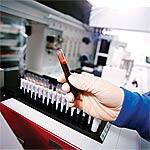The PLAC® test measures blood levels of an enzyme called lipoprotein phospholipase A2 (Lp-PLA2). The Lp-PLA2 enzyme unleashes a chain of harmful events culminating in endothelial dysfunction, which is a pathological abnormality in the blood vessel wall that sets the stage for atherosclerosis, plaque accumulation, and rupture.6
An elevated level of Lp-PLA2 may signal that an arterial plaque is susceptible to rupture, which could cause a clot to break loose, precipitating a heart attack or stroke.
Traditional markers of cardiovascular risk such as cholesterol levels tell physicians very little about acute risk of stroke or heart attack.7 However, there is an important biochemical relationship between low-density lipoprotein (LDL) and Lp-PLA2. LDL particles are oxidized by oxygen free radicals, and these oxidized LDL particles penetrate into the intima, the innermost layer of the blood vessel wall.8
The PLAC® test measures the activity of the Lp-PLA2 enzyme associated with LDL particles when they are oxidized. David G. Harrison, MD, FACC, FAHA of Emory University School of Medicine in Atlanta, GA, notes, “if one has an elevated PLAC® test, it indicates that the person has [inflamed] atherosclerotic plaques in which LDL oxidation is occurring.”
Lp-PLA2 is made in the plaque itself and acts as a specific marker of inflammation that appears to be directly involved in forming rupture-prone atherosclerotic plaque. Patients with coronary artery disease have markedly elevated Lp-PLA2 levels, reflecting build-up of vulnerable plaque in the blood vessel wall.7,8
An autopsy study of 25 patients with sudden coronary death used antibody to Lp-PLA2 to track its presence within diseased coronary arteries. Although early plaques had very light staining for Lp-PLA2, or none at all, ruptured plaques that had caused sudden death showed intense Lp-PLA2 staining deep within the plaque.9
Similarly, patients undergoing surgery related to atherosclerosis of the carotid artery, one of the main arteries supplying the brain, had intense staining for Lp-PLA2 within macrophages—a type of white blood cell involved in plaque inflammation. Those who had carotid artery disease without symptoms had much less intense staining for Lp-PLA2.10
PLAC® Test Predicts Acute Cardiovascular Events
 |
High levels of Lp-PLA2 predict increased rates of coronary heart disease and stroke in multiple population-based studies. Physicians from the prestigious Mayo Clinic and other experts recently reviewed more than 25 published studies of Lp-PLA2, including a compilation of 14 prospective epidemiologic studies of 20,000 patients. They concluded that Lp-PLA2 is consistently linked to higher risk of heart attack and stroke, and that this increased risk is not significantly changed when conventional risk factors for cardiovascular disease are also considered. They determined that Lp-PLA2 is unique in being highly specific for plaque inflammation, as well as being involved in causing that inflammation.11-13
The PLAC® test is as sensitive and more specific than other markers for the prediction of acute events, allowing for enhanced ability to identify people who are at increased risk for an acute ischemic event.
Lp-PLA2 has been shown to predict endothelial function in a number of studies.6,14 A striking example of this is a study showing that individuals in the highest third of Lp-PLA2 levels are more than three times as likely to have coronary endothelial dysfunction than those in the lowest third.14 In this study, Lp-PLA2 levels predicted endothelial dysfunction independently of their association with cholesterol and other cardiovascular risk factors. A review of available studies shows that individuals with high levels of Lp-PLA2 have about two to three times the risk for acute cardiovascular events, and that this risk is independent of traditional cardiovascular risk factors.2,12,13 The association of high Lp-PLA2 levels with acute cardiovascular risk holds true even in apparently healthy older adults.15
Although LDL and other lipids are not consistent predictors of stroke risk, elevated Lp-PLA2 approximately doubles stroke risk.7,16
No comments:
Post a Comment